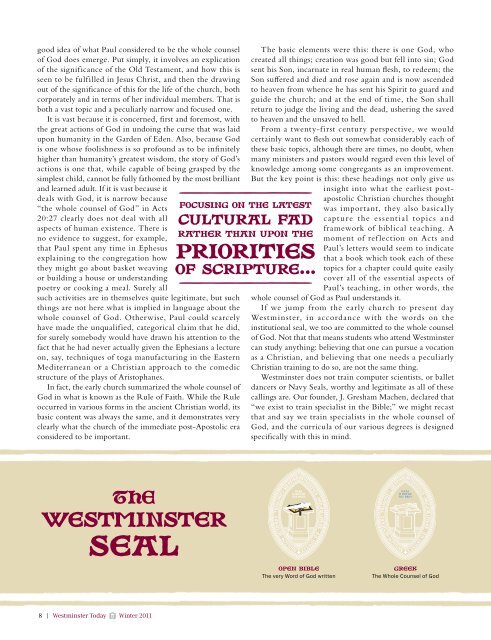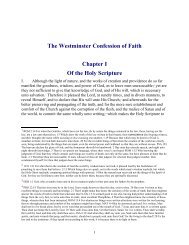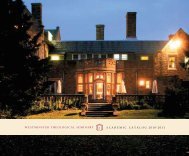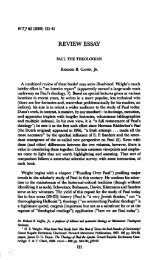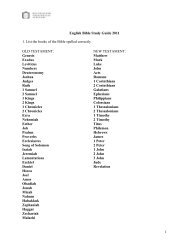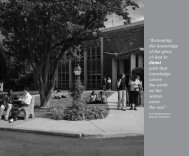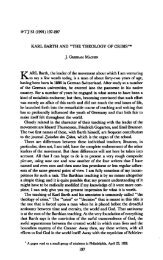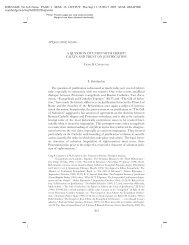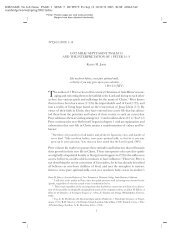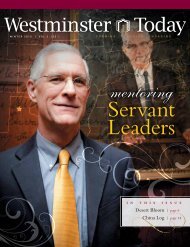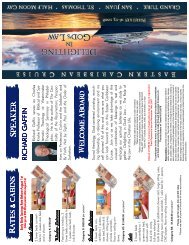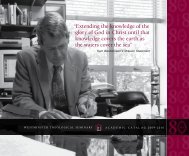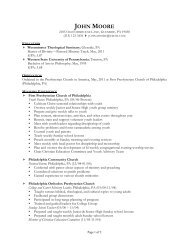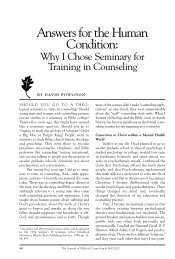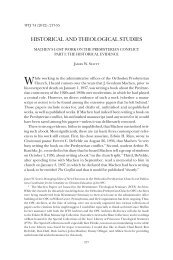Download a PDF here - Westminster Theological Seminary
Download a PDF here - Westminster Theological Seminary
Download a PDF here - Westminster Theological Seminary
Create successful ePaper yourself
Turn your PDF publications into a flip-book with our unique Google optimized e-Paper software.
good idea of what Paul considered to be the whole counsel<br />
of God does emerge. Put simply, it involves an explication<br />
of the significance of the old testament, and how this is<br />
seen to be fulfilled in Jesus Christ, and then the drawing<br />
out of the significance of this for the life of the church, both<br />
corporately and in terms of her individual members. that is<br />
both a vast topic and a peculiarly narrow and focused one.<br />
it is vast because it is concerned, first and foremost, with<br />
the great actions of God in undoing the curse that was laid<br />
upon humanity in the Garden of eden. Also, because God<br />
is one whose foolishness is so profound as to be infinitely<br />
higher than humanity’s greatest wisdom, the story of God’s<br />
actions is one that, while capable of being grasped by the<br />
simplest child, cannot be fully fathomed by the most brilliant<br />
and learned adult. if it is vast because it<br />
deals with God, it is narrow because<br />
“the whole counsel of God” in Acts<br />
20:27 clearly does not deal with all<br />
aspects of human existence. t<strong>here</strong> is<br />
no evidence to suggest, for example,<br />
that Paul spent any time in ephesus<br />
explaining to the congregation how<br />
they might go about basket weaving<br />
or building a house or understanding<br />
poetry or cooking a meal. Surely all<br />
such activities are in themselves quite legitimate, but such<br />
things are not <strong>here</strong> what is implied in language about the<br />
whole counsel of God. otherwise, Paul could scarcely<br />
have made the unqualified, categorical claim that he did,<br />
for surely somebody would have drawn his attention to the<br />
fact that he had never actually given the ephesians a lecture<br />
on, say, techniques of toga manufacturing in the eastern<br />
mediterranean or a Christian approach to the comedic<br />
structure of the plays of Aristophanes.<br />
in fact, the early church summarized the whole counsel of<br />
God in what is known as the rule of faith. While the rule<br />
occurred in various forms in the ancient Christian world, its<br />
basic content was always the same, and it demonstrates very<br />
clearly what the church of the immediate post-Apostolic era<br />
considered to be important.<br />
the<br />
WESTMINSTER<br />
SEAL<br />
8 | <strong>Westminster</strong> Today Winter 2011<br />
FOCUSING ON THE LATEST<br />
CULTURAL FAD<br />
RATHER THAN UPON THE<br />
PRIORITIES<br />
OF SCRIPTURE…<br />
the basic elements were this: t<strong>here</strong> is one God, who<br />
created all things; creation was good but fell into sin; God<br />
sent his Son, incarnate in real human flesh, to redeem; the<br />
Son suffered and died and rose again and is now ascended<br />
to heaven from whence he has sent his Spirit to guard and<br />
guide the church; and at the end of time, the Son shall<br />
return to judge the living and the dead, ushering the saved<br />
to heaven and the unsaved to hell.<br />
from a twenty-first century perspective, we would<br />
certainly want to flesh out somewhat considerably each of<br />
these basic topics, although t<strong>here</strong> are times, no doubt, when<br />
many ministers and pastors would regard even this level of<br />
knowledge among some congregants as an improvement.<br />
But the key point is this: these headings not only give us<br />
insight into what the earliest post-<br />
apostolic Christian churches thought<br />
was important, they also basically<br />
capt ure the essent ia l topics and<br />
framework of biblical teaching. A<br />
moment of ref lection on Acts and<br />
Paul’s letters would seem to indicate<br />
that a book which took each of these<br />
topics for a chapter could quite easily<br />
cover all of the essential aspects of<br />
Paul’s teaching, in other words, the<br />
whole counsel of God as Paul understands it.<br />
if we jump from the early church to present day<br />
<strong>Westminster</strong>, in accordance with the words on the<br />
institutional seal, we too are committed to the whole counsel<br />
of God. not that that means students who attend <strong>Westminster</strong><br />
can study anything: believing that one can pursue a vocation<br />
as a Christian, and believing that one needs a peculiarly<br />
Christian training to do so, are not the same thing.<br />
<strong>Westminster</strong> does not train computer scientists, or ballet<br />
dancers or navy Seals, worthy and legitimate as all of these<br />
callings are. our founder, J. Gresham machen, declared that<br />
“we exist to train specialist in the Bible;” we might recast<br />
that and say we train specialists in the whole counsel of<br />
God, and the curricula of our various degrees is designed<br />
specifically with this in mind.<br />
OPEN BIBLE<br />
The very Word of God written<br />
GREEK<br />
The Whole Counsel of God


